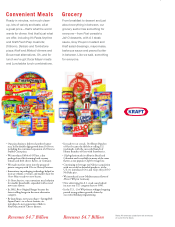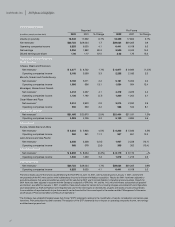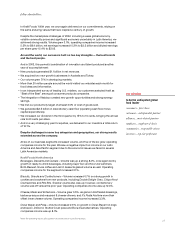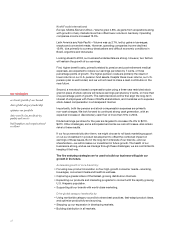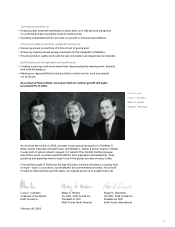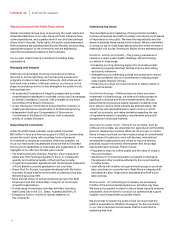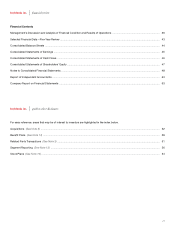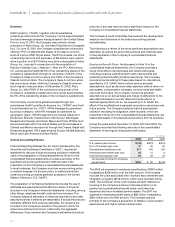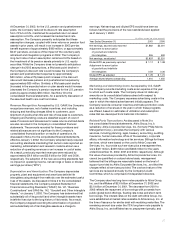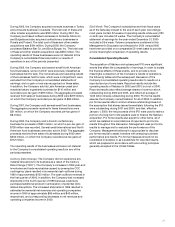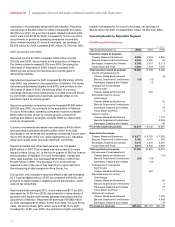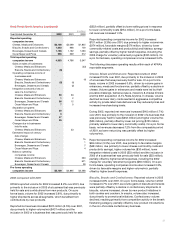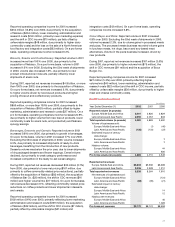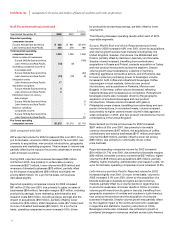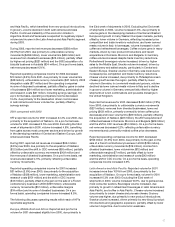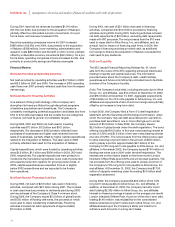Kraft 2002 Annual Report Download - page 32
Download and view the complete annual report
Please find page 32 of the 2002 Kraft annual report below. You can navigate through the pages in the report by either clicking on the pages listed below, or by using the keyword search tool below to find specific information within the annual report.
kraft foods inc. management’s discussion and analysis of financial condition and results of operations
the Company may repay some or all of the note with the proceeds
from external debt offerings.
The Company accounts for income taxes in accordance with
SFAS No. 109, “Accounting for Income Taxes.” The accounts
of the Company are included in the consolidated federal income
tax return of Altria Group, Inc. Income taxes are generally
computed on a separate company basis. To the extent that
foreign tax credits, capital losses and other credits generated by
the Company, which cannot be utilized on a separate company
basis, are utilized in Altria Group, Inc.’s consolidated federal
income tax return, the benefit is recognized in the calculation of
the Company’s provision for income taxes. The Company utilized
tax benefits that it would otherwise not have been able to use of
$193 million, $185 million and $139 million for the years ended
December 31, 2002, 2001 and 2000, respectively.
Business Environment
The Company faces a number of challenges in 2003, including
among other things, higher benefit costs, increased stock
compensation costs and weak economies in certain parts of
Latin America. As previously discussed, higher benefit costs are
expected to impact 2003 EPS by approximately $0.07 per share.
The higher benefit costs are primarily the result of lower returns
on pension fund assets, a lower discount rate and higher retiree
medical costs. The additional stock compensation costs, which
are expected to impact 2003 earnings per share by approximately
$0.02 per share, relate to restricted stock awards to employees.
These awards have a three-year vesting period and will further
align the long-term interests of employees with those of the
Company’s shareholders. The award of restricted stock to
employees (rather than stock options) is more transparent to
shareholders as the cost of the program is based upon the
average market price of the stock on the date of grant, rather
than a fair value generated by an option-pricing model. In Latin
America, political unrest in Venezuela, as well as the devaluation
of certain currencies, are also expected to negatively impact
2003 EPS.
The Company is subject to fluctuating commodity costs, currency
movements and competitive challenges in various product
categories and markets, including a trend toward increasing
consolidation in the retail trade and consequent inventory
reductions and changing consumer preferences. In addition,
certain competitors may have different profit objectives, and
some competitors may be more or less susceptible to currency
exchange rates. To confront these challenges, the Company
continues to take steps to build the value of its brands and
improve its food business portfolio with new products and
marketing initiatives.
Fluctuations in commodity costs can lead to retail price volatility,
intensify price competition and influence consumer and trade
buying patterns. KFNA’s and KFI’s businesses are subject to
fluctuating commodity costs, including dairy, coffee bean and
cocoa costs. Dairy commodity costs on average were lower in
2002 than those seen in 2001. Coffee bean prices were also lower,
while cocoa bean prices were higher than in 2001.
On December 11, 2000, the Company acquired all of the
outstanding shares of Nabisco for $55 per share in cash. The
purchase of the outstanding shares, retirement of employee stock
options and other payments totaled approximately $15.2 billion.
In addition, the acquisition included the assumption of
approximately $4.0 billion of existing Nabisco debt. The Company
financed the acquisition through the issuance of two long-term
notes payable to Altria Group, Inc., totaling $15.0 billion, and
short-term intercompany borrowings of $255 million. The
acquisition has been accounted for as a purchase. Beginning
January 1, 2001, Nabisco’s earnings have been included in the
consolidated operating results of the Company.
The closure of a number of Nabisco domestic and international
facilities resulted in severance and other exit costs of
$379 million, which are included in the adjustments for the
allocation of the Nabisco purchase price. The closures will
result in the termination of approximately 7,500 employees
and will require total cash payments of $373 million, of which
approximately $190 million has been spent through December 31,
2002. Substantially all of the closures were completed as of
December 31, 2002, and the remaining payments relate to
salary continuation payments for severed employees and
lease payments.
The integration of Nabisco into the operations of the Company
has also resulted in the closure or reconfiguration of several of
the Company’s existing facilities. The aggregate charges to the
Company’s consolidated statement of earnings to close or
reconfigure its facilities and integrate Nabisco were originally
estimated to be in the range of $200 million to $300 million.
During 2002, the Company recorded pre-tax integration related
charges of $115 million to consolidate production lines, close
facilities and for other consolidation programs. In addition,
during 2001, the Company incurred pre-tax integration costs of
$53 million for site reconfigurations and other consolidation
programs in the United States. The integration related charges
of $168 million included $27 million relating to severance,
$117 million relating to asset write-offs and $24 million relating
to other cash exit costs. Cash payments relating to these
charges will approximate $51 million, of which $21 million has
been paid through December 31, 2002. In addition, during 2002,
approximately 700 salaried employees elected to retire or
terminate employment under voluntary retirement programs. As
a result, the Company recorded a pre-tax charge of $142 million
related to these programs. As of December 31, 2002, the
aggregate pre-tax charges to close or reconfigure the Company’s
facilities and integrate Nabisco, including charges for early
retirement programs, were $310 million, slightly above the original
estimate. No additional pre-tax charges are expected to be
recorded for these programs.
During 2001, certain small Nabisco businesses were reclassified
to businesses held for sale, including their estimated results of
operations through anticipated sale dates. These businesses
have subsequently been sold, with the exception of one business
that had been held for sale since the acquisition of Nabisco. This
business, which is no longer held for sale, has been included in
2002 consolidated operating results.
28



